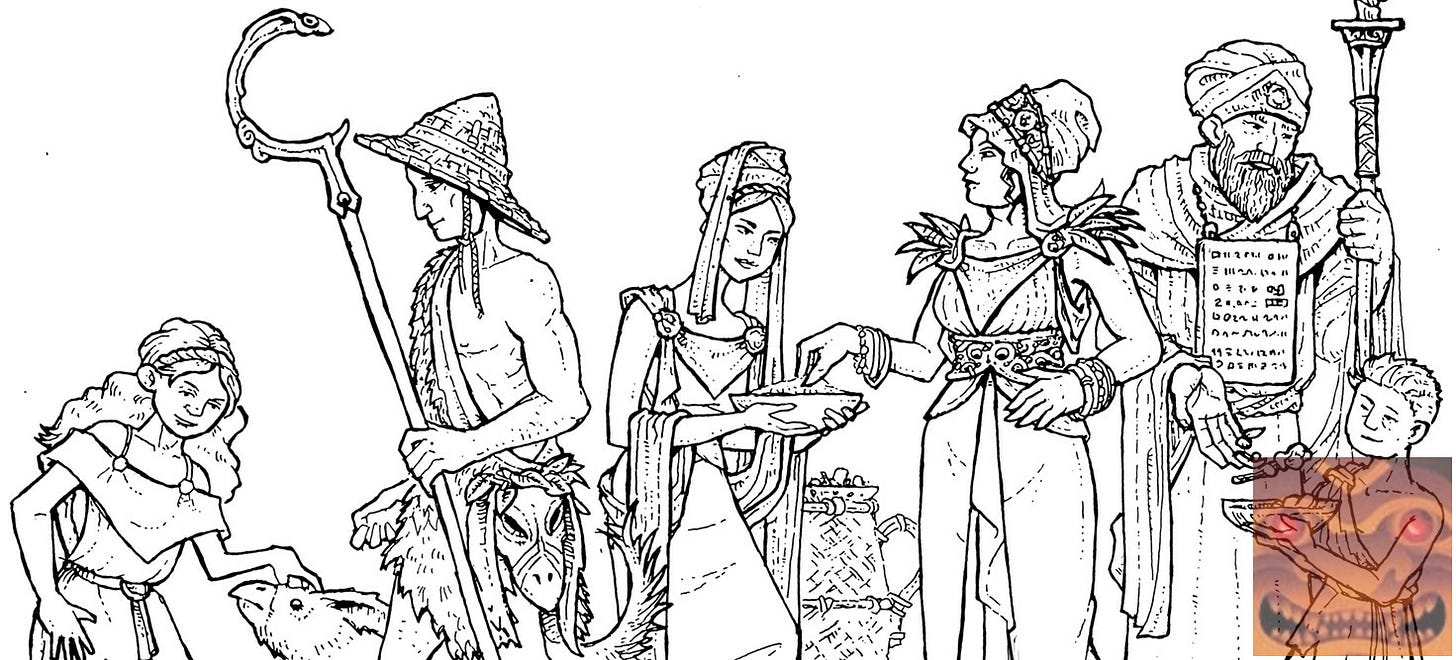Fortune and Necessity
A Concrete Example of Rules Adaptation

In last week’s post, I laid out the major reasons why I chose to base Secrets of sha-Arthan on Mörk Borg. I don’t think there’s a lot more to say on that front. However, if you’re still curious or have questions about my decision, please feel free to leave a comment or email me at jdmaliszewskiATgmail.com. I’m always happy to elaborate, though I suspect most of the heavy lifting has already been done.
This week, I’d like to offer something that I think might be more compelling than further explanations on that subject, namely, how I’m actually adapting Mörk Borg to suit the content and tone of Secrets of sha-Arthan. In my experience, the best argument for a game system is seeing it in action. So, over the coming weeks, I’ll be posting excerpts from my rules adaptations alongside additional pieces of setting material, each illuminating the other. My hope is that, taken together, these glimpses will show why Mörk Borg is the right foundation for SosA and how I'm shaping it into something uniquely my own.
A case in point are the Fortune and Necessity rules. For the benefit of those of you who aren’t already familiar with Mörk Borg, the game includes something called omens. Omens are a limited daily resource that let players influence the outcome of dice rolls, such as rerolling, reducing damage, or acting first. They’re not dissimilar to things like Fame and Fortune points in the old Top Secret game or Fate points in Warhammer Fantasy Roleplay, though the specifics obviously differ.
For Secrets of sha-Arthan, I’ve reworked the original omens rules to better fit the tone and setting of the game. It’s a good example of my overall approach: starting with the core mechanics of Mörk Borg and reshaping them to serve the unique feel of sha-Arthan. Like all the rules I’ll be sharing in the coming weeks, this version is still a draft. It’ll need playtesting to fine-tune and that’s something I’ll be discussing soon as well. As with Thousand Suns, my goal is to make sure the final version of Secrets of sha-Arthan is the best it can be and, for that, I’ll need your help.
Fortune & Necessity
The Light of Kolvu1 teaches that mortals stumble through the True World between two great forces, the spinning wheel of Fortune, ever-turning and wild; and the iron chain of Necessity, unyielding and sure. These powers weave every triumph and tragedy — capricious, relentless, and, at rare moments, kind.
A character begins play with two separate pools of supernatural favor: one for Fortune, and one for Necessity. These points represent moments when the cosmos intervenes, whether through chance or through fate.
Starting Points
Each character starts with:
Fortune Points:
d4(if the class favors fortune)Necessity Points:
d2
—or—
Fortune Points:
d2Necessity Points:
d4(if the class favors necessity)
Balanced character classes begin with:
Fortune Points:
d3Necessity Points:
d3
Spending Points
Fortune Points may be spent before or after a roll to do one of the following:
Reroll any die (yours or an enemy's)
Lower the DR of one test by –4
Deal maximum damage on one attack
Avoid a critical or fumble
Find an unlikely coincidence or minor lucky break (referee discretion)
Necessity Points may be spent only before a roll or at a moment of consequence:
Succeed at a test you would otherwise fail
Reduce incoming damage by
d6Resist a compulsion, spell, or fear with personal resolve
Intervene to fulfill a prophecy, duty, or vow (referee discretion)
Prevent death, but only once per character — ever
Regaining Points
Fortune and necessity are fickle and mean. You regain all spent points of one type (your choice) after the next sunrise, but only if you had spent all points of that type before resting.
Example: If you used both your Fortune Points, you may roll to restore them after sunrise. If you still had 1 left, nothing returns.
Some class features, relics, prodigies, or places of power may offer other ways to regain or manipulate these pools.
No, the spelling Kolvu with an “o” is not a mistake. It’s a change from original spelling of Kulvu. I did this for the simple reason that I wanted the Onha language to be both easy to pronounce and devoid of accent marks. That meant, among other things, that each vowel had one and only one pronunciation. In my head Kulvu had always been pronounced “kul-VOO,” with the first “u” being short, as in the English word must. Unfortunately, this ran counter to my own pronunciation rules. That left me with the choice of either changing the pronunciation to “kool-VOO” or changing the spelling. I opted for the latter, now spelling it Kolvu and pronouncing it “kohl-VOO.”


I love the sound of it, it has a nice "Greek Tragedy" feel.
But.
I usually find that tracking two concurrent meta-currencies is something of a hassle, especially when they have multiple similar effects.
What if, according to class, each character had only Fortune OR Necessity?